Ghanatta Ayaric, Robert Asekabta, John Agandin and Franz Kröger
Franz Kröger House
Azantilow Senior High Technical School, Sandema
Ghanatta Ayaric: Finding a good friend in Germany
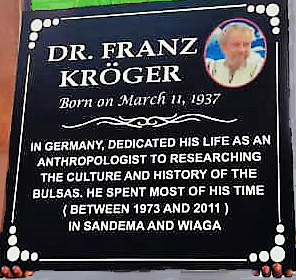
The plaque to be fixed near the entrance of the F.K. House
Dr Franz Kröger was honoured by the Bulsa at a simple ceremony accompanied with several activities that took place in Sandema between 18th and 21st February 2023. The honour took the form of a dormitory (residential house) named after him in recognition of his life-long work on Bulsa culture and society. A teacher by profession and a social anthropologist by calling, Dr Kröger leaves an indelible impact on knowledge and scholarship on the Bulsa people of North Ghana.
Though German by birth and nationality, Dr Kröger is Bulsa by all accounts except the skin colour. A Buli-English dictionary (a ground-breaking publication), books on Bulsa rites of passage, ancestor worship, countless publications on the Bulsa, and a journal of Bulsa culture and society are among the many achievements that make Dr Kröger a special Bulsa and friend of the Bulsa. His interest and field of research includes Bulsa-speaking people like the inhabitants of Kunkuak and Kategra (Northern Region) and Biuk (Kasena-Nankani-East District) who are administratively and officially no longer part of Bulsaland.
Dr Kröger is an authority on the Bulsa; he’s a reservoir of the Buli language. And his deep knowledge and understanding of Bulsa customary practices is simply fascinating. Deity and ancestor worship, funerals, marriages, in fact, a substantial amount of everything about the Bulsa, from birth, childhood, adolescence, adulthood to life as an elder and death, as preserved in the oral tradition now exists in documented form, thanks to his efforts and interest in Bulsa culture and society. And I must add that it takes passion and love for anyone to dedicate their life to researching, learning, and understanding other people the way Dr Kröger has done among the Bulsa. Academic research and publications cost money. For his early research work in the 1970s and 1980 Dr Kröger was granted subsidies by the German Research Society (DFG). The cost of the rest of his research work and subsequent publications, as well as his sojourn and visits in Buluk till 2012, were financed by him alone. Such selfless effort on the part of any individual deserves praise, respect, and recognition. I take the opportunity here to acknowledge the contributions of other friends of Dr Kröger and friends the Bulsa, too, in this regard, namely the late Prof. Rüdiger Schott, Dr Barbara Meier, Dr Anne Schwarz and all those whose names do not immediately come to mind.
Even though Dr Kröger started his work on the Bulsa in the 1970s, I must admit, I had neither known him nor read any of his works on the Bulsa until I came to Germany in 1986. A cousin of mine who lives and works in Münster, Germany, Margaret Lariba Bawa Arnheim, herself a former student of Dr Kröger at Sandema Boarding School and a close friend of his, introduced me to him. At the time, he was working on his Bulsa-English dictionary and would ask me to help with clarifying the meaning and sounds of certain Buli words. It was during that period that it dawned on me that I was almost illiterate in my own language. The discovery didn’t only embarrass me. The feeling triggered in me a personal challenge and desire to learn to read and to write Buli, fortunately. Thankfully, I did just that in the following years, using the then published Buli-English dictionary as my main source of reference. Isn’t it paradoxical that a Bulsa, who grew up in Buluk, had to learn to read and write his mother tongue in Germany? Not having learned to read and write Buli at school in my childhood, it was very probably that I would never have learned and been literate in the language if I hadn’t come to Germany and known Dr Kröger for that matter. At best learning to read and write Buli would have been delayed. I am very proud of my personal copy of the Buli-English dictionary which contains a hand-written autograph of the author, Franz Kröger.
Dr Kröger guided me in my dissertation on the oral literature of the Bulsa presented to the University of Bremen, Germany, in partial fulfilment of the requirements for the master’s degree. And when I contemplated doing a doctorate after that, I sought his advice on the proposed topic. Franz was very interested in the idea and in the sketchy proposal I sent him. He encouraged me and agreed to guide me through my research and related matters. However, I abandoned the idea and had to “disappoint” him, and my professor at the University of Bremen who had me in his plan for the establishment of a seminar on African literature in the English Department. Instead, I opted to train as a secondary school teacher to be able to work at German schools.
As a teacher-trainee, I could count on Dr Kröger’s many years’ experience as a senior secondary school (Gymnasium) teacher both in Germany and in Ghana, Sandema Boarding School in this case. And when we started BULUK, Journal of Bulsa Culture and Society, in 1999, the passion for the common project brought us even closer and I am privileged to call him a friend. I have enjoyed hospitality in his humble home in Benninghausen on several occasions. Being his guest always feels like visiting Bulsaland. His humble personality, the Bulsa artefacts in his house, the countless Bulsa photos, the rich library in which I find almost every information I need on my people, the Bulsa, always immediately immerse me in my roots and culture and make me feel at home. I presume that Bulsa who have also visited Dr Kröger in Benninghausen would testify to the same feeling.
Dr Kröger is easy-going, a principled, disciplined, and conscientious man in everything he does. Knowing and working with him has been an enriching experience for me. Many young Bulsa may not know him personally but most of them know him on social media, Facebook, where he sometimes joins in discussions on Bulsa history, culture, and language, revealing deep and well researched knowledge on the Bulsa. I am proud of the respect he commands and the recognition he enjoys among Bulsa and friends of the Bulsa.
The decision to honour him by naming a dormitory house at Azantilow Senior High Technical School, Sandema, after him is befitting. Dr Kröger and the late Sandem-Nab Dr Azantilow Ayieta were friends, and it is good to have the names of these two outstanding Bulsa personalities under one roof.
Finally, many thanks go to all the Bulsa friends of Dr Kröger, Robert Atong Asekabta, John Akanvariyuei Agandin, Evans Akangyelewon Atuick, Atigsibadek Afoko and my humble self, to name a few, who advocated for an honour to be bestowed on him. This group in turn expresses gratitude to the Paramount chief of the Bulsa, Sandem-Nab Azagsuk Azantilow, the chiefs of the Bulsa Traditional Council, the author of the Facebook page Celebrating Our Legends, Awonboro Azantilow, and all those who worked in diverse ways together to make the recognition possible. Hope for the establishment of a Bulsa Culture Museum someday, one of Dr Kröger`s cherished wishes, continues to stay alive, nevertheless.
Dear Franz, enjoy this honour to the full and in the knowledge that Bulsaland is your African (Ghanaian) home, your name will always be linked with Bulsa culture, history, and language, above all, for generations of Bulsa to come. Danke schön, as it is said in German.
Robert Asekabta: Speech held at the house-naming ceremony at Sandema Senior High Technical School on 20 February, 2023
I first met Dr Franz Kröger in 1973 when he was teaching at the then Sandema Boarding School (today Sandema Senior High School). He was introduced to me by the late Rev. James Agalic as an anthropologist who was doing research work on Bulsa culture. My family home, Asekabta-yeri, is a stone-throw away from the boarding school, so Dr Kröger and I exchanged mutual visits, and he would interview me on some Bulsa customs such as pobsika the naming ceremony of babies and other practices.
Dr Kröger lived like any ordinary Bulsa man, ate Bulsa food and participated first-hand in the performance of customary rites. He also travelled round Buluk to trace and gather information on the history of Bulsa and Bulsa cultural practices. In fact, he is the first non-Bulsa to trace the history of Atuga, the founder of north Bulsa, namely, Sandema, Wiaga, Chuchuliga, Siniensi and Kadema. He “discovered” or helped us through his thorough research findings to know where Atuga first settled, at “Atuga Pusik” located between Sandema and Wiaga. I wrote a play entitled “Atuga, the Founder of Bulsa” but lost the script. To my surprise Dr Kröger had a copy of it, which I probably gave him when we he started his research and we worked together.
We are grateful to Dr Kröger for the effort he put into tracing the history of the raids in Buluk by Babatu. His research work has thrown light on the location of battlefields on which the Bulsa stood up against the marauding raiders cum slave traders and caves where women, children and old people were hidden to avoid capture or save lives or both.
The documentation of aspects of Bulsa history and traditional practices customary practices apart, Dr Kröger wrote the first complete Buli-English dictionary to date which is based on the various tones spoken in Bulsa North (Kori), Bulsa South (Yening) and Chuchuliga respectively. I was one of his informants representing the tones spoken in Bulsa North. In the interim, a digital version of his dictionary, A-Z Buli Dictionary, is available as an application on the internet for those who have no access to the hard copy. Dr Kröger has also written papers on Buli for beginners. This comes in handy for non-Buli speaking visitors to Bulsaland.
His interest also covers the natural environment of the Bulsa people. In this regard he has a collection of vocabularies of animals, plants, and trees endemic in the area. Schools, students, and teachers alike stand to benefit immensely from such material.
BULUK, Journal of Bulsa Culture and Society which he co-edits with Ghanatta Ayaric and which appears annually is a special highlight in the documentation of the history and traditional and customary practices of the Bulsa people. It also contains current news and events in Bulsa society and about Bulsa people at home and abroad.
There is a lot to say and write about this exceptional friend of the Bulsa. I hope this brief write up gives readers some brief insight about the man`s outstanding work on the Bulsa people. The honour bestowed on him may be overdue, but not late. We share in the joy that this recognition brings Dr Franz Kröger.
Preceding Events and the Program of Renaming
(Information about the program by R. Asekabta and S. Akooti)
April 22, 2022
An article titled “Celebrating our Legends” appeared in the Facebook group “Buluk Kaniak”. The anonymous author and many followers supported the idea of naming a school, the new museum or a street after Franz Kröger.
November 5, 2022
In telephone calls the Sandem-Nab and his son, Mr. Awonboro Azantilow, told F. Kröger that
the new museum would be named after F. Kröger.
November 21, 2022
In a telephone call Mr Solomon Akooti, headmaster of the Azantilow Senior High Technical School told F. Kröger that there would be still many repairs at the museum building. Therefore it was decided to name one house of his school after F. Kröger.
February 18, 2023
A float (march) from the school to Sandema started. It surrounded the market, performed dances and continued its march to the Sandem-Nab’s palace. During the float the students of the school, accompanied by musical instruments, sang songs in praise of F. Kröger.
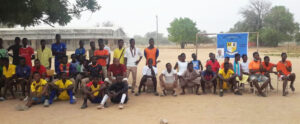
Students gathering before starting the float
February 19 until 22, 2023
Football matches were played between the houses of the school. The names of the male students’ houses and their colours (e.g. of the football dresses) are:
1. Rawlings House (red), 2. Acheampong House (yellow), 3. Limann House (green), 4. Franz Kröger House (usually blue, in this competition green), 5. Nkrumah House (white).
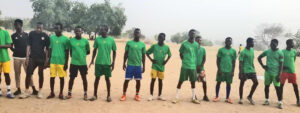
Football team of the F.K. House
February 20, 2023
Naming ceremonies in the hall of the Sandem-Nab’s palace (where the Sandem-Nab usually sits in state). Robert Asekabta held a speech in honour of F. Kröger (see above).
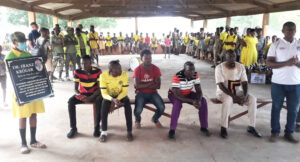
Meeting in the hall of the royal palace with the headmaster (Mr Akooti, standing) and other teachers of the school (sitting)
February 22, 2023
Final of the football matches and cultural display.
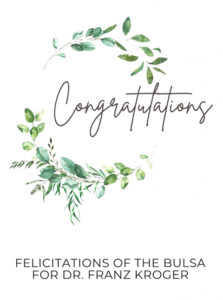 John A. Agandin and others: Congratulatory Messages for Franz Kröger on the Naming of a House after him
John A. Agandin and others: Congratulatory Messages for Franz Kröger on the Naming of a House after him
John Akanvariyuei Agandin
Franz, I can only hope that you’re as proud of yourself as I am. You are a hero worthy of this honour for the trail you have blazed and the seeds of inspiration you have sown in many Bulsa hearts for the study of their own history, culture and language. Words are not enough to express my admiration and affection for you personally and for your work. Naawen te fu nyinyogsa ale nyuvuri wong.
Nelson Abalaba Akum
We are so grateful to him
Evans Atuick
Kröger is the superglue that binds bulsa culture, language, and people together as no singular person than him as spearheaded and influenced the study and publishing in Bulsa’s history, culture, lexicon and heroes, etc. I grew up watching him on his famous “Busanga volvo” bike around Wiaga talking to old men and participating in everything. My dad who was once Kröger’s assistant had copies of his works, including the dictionary. He told me a lot about him and encouraged me to read his works. This inspired my interest in the Bulsa culture and my desire to become an anthropologist like him. I am honoured to have worked with him and written some articles that have been published in the journal of Bulsa culture. Therefore, this recognition is long overdue for it is better to honour a man while he is still alive than when he is dead. Congratulations, Sir!
Paulina Atiik Morton-Bruce (Mrs)
Thanks and God bless you for bringing Bulsa Culture, History, and our stories to light and making us proud. Naawon Niak fu.
Rev. Fr- Isaac Akapata
Best wishes and God’s blessings on the Prof, who I have had the opportunity to research into my own village and people a decade ago.
Ignatius Akaboka
Your immense knowledge in Buluk tradition does not only show your love for the people of Buluk but equally gives a meritorious right as an indigene . We do appreciate your work, some of us learned a lot through your Buli journals. Naming a dormitory in your name goes a long way to tell how the people of Buluk appreciate your contribution in Buluk history and tradition. It is my hope that the Name will be an inspiration for the occupants of the dormitory.
Joseph Aduedem
Congratulations Dr. You ignited and sustained my interest in literature about the Bulsa Buluk and Buli. Your interest in guiding and encouraging young people from the soil to pen down things about the Bulsa is worth mentioning as well. Congratulations and many thanks to you.
Philip Akisikpak
Congratulations. Greatly appreciate your works
Priscilla Hamidu
Thank you for your enormous contribution to making Buluk great. God bless you
Carlven Afelik
The said individual is great – Builsa Great
Alfred Abuura
God bless you Dr. You’ve served Bulsa land well.
Bernard Akanbang
Congratulations to Dr Kruger for a well deserved honour. He has laid a solid foundation for the growth and development of Bulsa culture. His contribution continues to inspire many young Bulsas to love and appreciate their culture. May this token recognition gladden your heart for the selfless dedication and sacrifices to studying and documenting the culture of the Bulsa people
Rev. Father Vitus Awentemi Adiita
With esteemed regards and gratitude for your work and contribution to Buluk literature and culture. Hearty wishes.
Alexis Asuinura
Thank you for everything you did and continue to do for Buluk. More Blessings
Albert Agoabey Anamogsi
Dr. Kroger as was affectionately called by family “Baba Felika” has made an indelible and invaluable contribution to historical development of Buluk and my life as a person as he has witnessed my inception to this world till date.
Honouring you at the Sandema Technical High School is not enough considering your significant contribution to history and anthropology regarding the Builsa. I join the world today to celebrate you and to appreciate you for the invaluable contribution you made in my life and the lives of my family. My father, Anamogsi would always be happy to have you as his “first son” and so are we his children.
We indeed cherished the times you stayed with us and we look forward to meeting you again. I have not forgotten about how I border you with my basic school academic work. May God Richly bless you and keep you safe and healthy.
I am hopeful that we will meet in the near future to share some memories. Until then many blessings to you, Dr. Franz Kroger.
Timothy Akanpabadai
Your contribution to Buli literature is enormous.
Joseph Aduedem
You have ignited and sustained my interest in literature about the Bulsa, Buluk and Buli. Reading your works have been so enriching. And believe you me, any work about the Bulsa as at now cannot but to rely on your works. Much thanks to you for the Buli-English dictionary
Mahmoud Malik Saako
Thank you Professor Dr Kombon Naaba for your interest in Buluk history and culture. We are proud of you Kombon Naaba Kroger
Michael Kwaku
We are proud of you sir.
Ali Anankpieng
We’re proud of him and appreciate his contribution to Buluk.
Denis Awiak
The good Lord continue to bless and keep him long
Demyere Didongo
My best wishes to you sir
Akpaliok Lincoln
Congratulations
But for Franz Kroger some historical facts of the Builsa tribe would have remain in a state of oblivion. I’m particularly happy with your writings on the entrance of the gospel and how it spread within the Builsa community. Your work and love for the Builsa community is unmatched, this is visible in the many articles you have authored. To the leadership of Azantilow senior high we celebrate you for this novel move. Thanks for the opportunity.
Sofo Ali-Akpajiak
Dr. Krueger, We can’t thank you enough for what you have done for the people of Bulsa. You lived with us, slept in the villages and travelled widely. Your mission was to make the unknown known. Your publications have helped to educate us and refuted some of the misrepresentation of our culture and other aspects of our governance system. We appreciate you. Thanks very much.
Gideon K. Awiak
We appreciate the contribution you’ve made in preserving the culture of the Bulsa people. Buluk owes you immensely.
Jerome Aparik
We are eternally grateful!
David Amanyese Azantilow
Thanks bro for your initiative
Simon Gibson Achavuusum Anuegabey
Man’s culture is his directional compass that gives him direction and locate him to his true identity. Thank you, Dr. for doing a yeoman’s job in trying to help us preserve our identify.
BHCS Sandema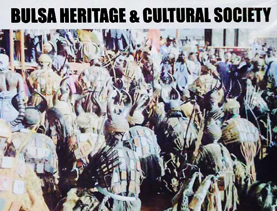
On the occasion of the christening of Dr. Franz Kröger House at Azantilow Technical High School in Sandema, all of us at BHCS wish to express our respect, admiration and affection to you for your contribution to the documentation and promotion of Bulsa history, culture and language! Naawen Niak fu!
Franz Kröger: Thank You!
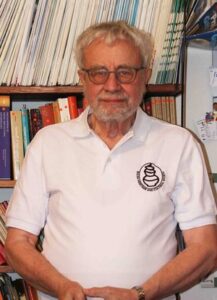
F. Kröger 2019
Towards the end of my active fieldwork in Ghana, I asked myself what qualities distinguished the Bulsa from Europeans and other ethnic groups in Africa. I came to the conclusion that, among other qualities, the following are the most striking:
• politeness and helpfulness
• hospitality (especially towards strangers?)
• gratitude (jiam teka)
Regarding the first characteristic, it is not only the good manners that impress the European. I myself noticed an often-used phrase that is rarely used in Europe: “I did it just to please you!” It seems to me that almost no request can be refused to an impertinent supplicant, even if fulfilment seems impossible or only possible with great effort, while a clear “No!” probably does not correspond to the Bulsa code of conduct.
When I wanted to buy stamps at a post office, I queued in front of the counter in the blazing sun. The person in front of me immediately gave up his place to me, then the person in front of him, etc., until I finally found myself at the front of the queue with a very uncomfortable feeling.
As a driver, you may be exposed to a variety of obstacles and breakdowns in Buluk, but you don’t have to worry about having to deal with them alone. The next car will stop or some residents of a nearby house will come running up to you, and soon you will hear the question, “Can I help you?”
I experienced Bulsa hospitality in particular when, after stays at the Sandema Resthouse, the Presbyterian Mission and the Sandema Continuation Boarding School (1973-74), I wanted to live in a traditional compound for the duration of an entire stay. I asked my then co-worker and friend, Mr Leander Amoak, whether a compound could be found in his section (Wiaga-Sinyangsa-Badomsa) that would not only provide me with accommodation and food but also allow me to participate fully in its secular and religious life. Leander’s reply was, “It is up to you to choose a suitable compound; all are ready to help you.” I chose the largest Badomsa compound (Anyenangdu Yeri), whose head was both teng-nyono (sacrificer to a tanggbain), tiim nyono (medicine man) and kpagi (elder). This choice had a decisive influence on the success of my research. I was allowed to participate in all profane and religious activities, and in 1994 I was even able to make an inventory of all the household goods of the compound to find out to what extent traditional utensils and vessels had already been replaced by modern or imported objects. In Germany such an undertaking would certainly have caused great problems.
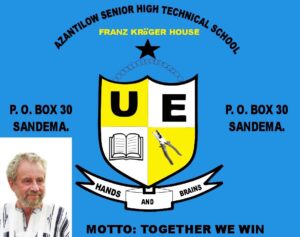
The banner, used at sport events and big ceremonies of the school
The last of the mentioned qualities, the frequently-expressed gratitude, permeates all traditional and modern Bulsa life to a greater extent than in many other societies. It plays a major role in the final stage of all sacrifices. The question of who thanks whom is not easy to answer because, to a stranger, it often looks as if everyone thanks everyone: the sacrificer thanks the spirit of the sacrificed shrine, some active participants thank others. Visiting outsiders (maaroba, lit. ‘helpers’) are also thanked for their help, although this has only consisted in their being present. Most of the time, thanks are not only expressed in words but also with material objects. After the sacrifice of an animal, all those present receive a portion of the sacrificial meat. When an earth spirit (tanggbain) allows the earth of his material body to be dissolved in water and offered as a drink to a sacrificial group, this is not only an ordeal (teng-nyuka) but also demonstrates his/her gratitude for the sacrificed animal.
Assistance, be it visiting a sick person or participating in a festival, is often reciprocated by a return visit from the head of the compound (yeri-nyono) and sometimes even includes the gift of a chicken.
Before my first visit to Ghana, I had read some books on reciprocity regarding the exchange of gifts and tried to verify the statements made in the books. When I visited a foreign compound head with a request for ethnological information, I gave him a handful of kola nuts (goora) as a counter-gift, believing that I was thus establishing a certain reciprocity. I was therefore surprised when the yeri-nyono gave me a chicken as a “thank you” for my visit when I left. In this case, the law of balanced gifts was broken and did not fit completely into the rules of reciprocity.
Showing gratitude is not only a phenomenon in traditional Bulsa society, either. I recently found examples in the posts of the Bulsa Facebook group “Celebrating our Legends”. The (anonymous) editor and author thanked me for my research into Bulsa culture, language and history. More than the article itself, I was impressed and moved by the reaction of the educated readers who expressed their approval in words of praise. As stated above, Bulsa often wish to complement their thanks with an accompanying counter-gift. There was a wide variety of suggestions in their posts: naming a street, the new museum, a school or another building after me…
It was extraordinary for me that, to my knowledge, not a single critical or dissenting voice appeared. I had expected considerations such as “Don’t we have enough deserving Bulsa to be honoured by naming our houses after them?” To analyse this question, I refer to the beginning of my article and its exploration of the concepts of courtesy and helpfulness (also and especially) towards strangers.
The article “Celebrating our Legends” probably served as the impetus for naming a building with the name Franz Kröger. After plans to name the new Bulsa museum in my honour fell through, another opportunity arose. A house of the Senior High Technical School in Sandema had been named Azantilow House. However, when the whole school was named after the last Sandema-Nab, the house with dormitories had to be renamed. On 18 February 2023, I had the honour of being the new name bearer.
This was preceded by long negotiations and preparations of various kinds. Many Bulsa had committed themselves with all their might to the realisation of the project, and I would like to thank them on behalf of many others.
• The author of “Celebrating our Legends” and the many supporters of his proposal.
• The reigning Nab Azagsuk Azantilow II as well as his son Awonboro and other members of his family. Without the initiative of this energetic chief, the naming would probably never have come about.
• It is due to my personal friends Ghanatta Ayaric (Hamburg), Robert Atong Asekabta (Sandema), John Akanvariyuei Agandin (Southern Ghana), Evans Akangyelewon Atuick (USA), Atigsibadek Afoko (Southern Ghana) and others that the idea, once conceived, was not forgotten. Above all, Robert Asekabta, who himself belongs to the royal family, not only led the personal contacts with the Sandem-Nab, but he also delivered a speech at the naming ceremony and provided me with the most important photos of all activities.
• Administrative institutions such as the Bulsa Traditional Assembly and the Board of Governors (including the Director of Education) gave their approval and thus also legally secured the renaming.
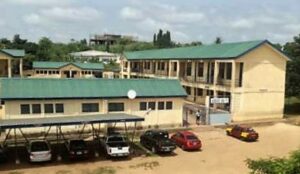 • I would like to thank Mr. Solomon Akooti, headmaster of the Azantilow Senior High Technical School, for his organisational work and for his numerous e-mails informing me about the state of affairs. In the same way, I would like to thank the other planning committee members, Paul Sulley (Senior Housemaster) and Akanvarisagi Akan-nue Emmanuel (Housemaster), for their efforts.
• I would like to thank Mr. Solomon Akooti, headmaster of the Azantilow Senior High Technical School, for his organisational work and for his numerous e-mails informing me about the state of affairs. In the same way, I would like to thank the other planning committee members, Paul Sulley (Senior Housemaster) and Akanvarisagi Akan-nue Emmanuel (Housemaster), for their efforts.
• From the photos taken by Robert Asekabta, I can conclude that many students were also involved in the implementation of work. My gratitude goes out to them and the football players, also from other houses, for making the event more attractive to a larger number of visitors.
I hope that after the completion of the festivities my good relationship with the school, its teachers and students will intensify through further contacts and that my relationship with the Sandem-Nab and the Bulsa in general will remain as friendly as before.
N TE FU JIAM!
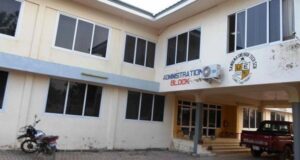
Administration Block of Azantilow Senior High/Technical School (Source:www.a1rdioolnline.com)
- Editorial
- Events
- Ghanatta Ayaric: Prof. S. Abanteriba awarded Medal of the Order of Australia (OAM)
- Franz Kröger House – Azantilow Senior High School, Sandema
- Franz Kröger: The Parliamentary and Presidential Elections 2020
- Franz Kröger, Robert Asekabta and Kennedy Azantilow : Electing New Bulsa Chiefs (2021-2022): Qualifications of a chief, elections in Fumbisi, Doninga, Kadema and Bachonsa
- Kennedy Azantilow and others: Feok Festival (and Associated Events) 2022
- Augustine Atano: Feok Festival 2020 (Review)
- Augustine Atano: The duration of the Feok Festival
- Augustine A. Atano: Feok Festival 2021 (Review)
- Kennedy Azantilow: Feok Festival 2022
- Franz Kröger: Who on Earth is Interested in the Bulsa?
- Franz Kröger: Obituaries
- Margaret Arnheim: Maaka in Buluk
- Martin Anbegwon Atuire: Bleeding Palimsests: Heritage Tourism…
- Kwesi Amoak: Review of Dr. Caesar Atuire’s “Philosophical Underspinnings of an African Legal System
- Joseph Aduedem: A Stranger in Her Own Land – The Position of Women in Bulsa Society
- Joseph Aduedem: Kisuta (taboos): Their Origins and Significance among the Bulsa
- Joseph Aduedem: Abunoruk maari Asuom / Abunoruk helped Asuom
- Joseph Aduedem: Yog Wiik
- Franz Kröger: The First Picture of an African Woman
- Franz Kröger: Recent Bulsa Publications
- Commentaries in the Internet Edition of Buluk
- Abdul-Rauf Akan-mwanatechaab: Brothers in Skirt
- John Agandin: The Fires Eat the Land at Home
- Bulsa Cuisine
- Ghanatta Ayaric: The New Masim Rice-Mill in Fumbisi